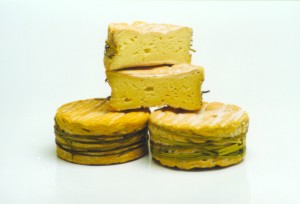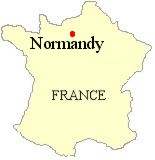
|
|
|||||
Livarot is one of the great Normandy cheeses and one of the oldest. It is thought to have monastic origins, having a typical washed rind and pungent aroma, with its making being taught by the monks to the local farmers many years ago. It is similar to other cheeses of Normandy such as Pont l'Evêque and Pavé d'Auge and used to be known as the 'meat of the poor'. The distinguishing feature of Livarot is its bindings of sedge leaves. Strips of this marsh grass are wrapped around each cheese, originally to prevent the weaker cheeses from collapsing. The resemblance of these strips with the stripes of the military rank has led to the cheese being nicknamed the 'Colonel'. Each cheese is made with a mixture of skimmed evening and whole morning milk (unpasteurised cows' milk) giving a fat content of 40-45% (as opposed to 48% for whole fat milk). The curds and whey are scooped into round moulds and the whey is allowed to drain off. The cheeses are then turned and washed with brine which has been coloured with annatto. Maturing takes place in warm, humid cellars for up to two months. Livarot has a full and assertive flavour, a supple texture and a pungent aroma. The rind is brown-orange due to the annatto washings. Livarots are made in three different sizes as specified in its AOC (granted in 1975): Trois-quarts (three quarter size) at 10.6cm diameter; Petit-Livarot (small) at 9cm diameter and the Quart-Livarot at 7cm diameter. Almost all of the Livarot produced today is made in large creameries using pasteurised milk and yield blander cheeses. At The Teddington Cheese we sell the original unpasteurised farm-made 250 gramme Petit-Livarot with its original and lively character. Livarot is excellent on the cheese board although it is best tasted after milder cheeses. It is best enjoyed with a full-bodied red wine, a glass of Normandy cider or even a nip of Calvados. Click here or press your 'Back' button to return |
|
|||||
| All articles © www.teddingtoncheese.co.uk | ||||||
